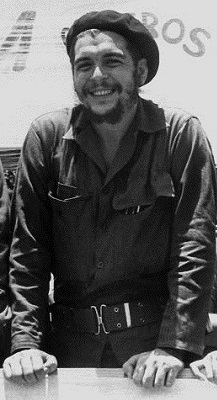|
~ Ernesto Che Guevara
~ Galéria
~ Oldal
~ Bejelentkezés
~ Vissza a Főoldalra
Ernesto Che Guevara, az argentin származású forradalmár, miniszter, gerillavezér és író, Buenos Aires-ben szerzett orvosi diplomát, majd a kubai forradalom során jelentős szerepet játszott a szigetország felszabadításában és újjáépítésében. A kubai gazdaság talpraállításáért dolgozott, küzdött az oktatás és az egészségügy fejlesztéséért, az írástudatlanság és a faji előítéletek felszámolásáért. Saját példájával népszerűsítette az önkéntes munkát. Kongóban és Bolíviában is harcolt - harminckilenc éves volt, amikor az amerikai-bolíviai csapatok csapdába ejtették és kivégezték.
| | |
|

| | |
|
|
|
Che Guevara, una perspectiva del periodismo
|
|
|
For today, you will be given a long and interesting-looking article in Spanish. (And one day I will be able to translate it into English...]
Che Guevara, una perspectiva del periodismo
“El miércoles por la noche el Che Guevara se las arregló para responder a mil preguntas: un enjambre de periodistas lo acribilló sin piedad, y el Che tuvo ocasión de demostrar su habilidad política”. Así describe Eduardo Galeano la conferencia de prensa ofrecida por Che, en su condición de jefe de la delegación cubana, durante la reunión ministerial del Consejo Interamericano Económico y Social, celebrada en Punta del Este, en agosto de 1961.
Esta es, probablemente, la imagen más recurrente en la memoria, ante la idea del vínculo entre Che Guevara y el periodismo: el líder revolucionario de cara a la interrogante, reflexiva o insidiosa, compleja o simple. Che se nos aparece más como entrevistado, enfrente de uno o varios periodistas –cuestionario en ristre-, a través de sus respuestas. Desde la confesión de patria latinoamericana(1), hasta la declaración rotunda de su desinterés por un socialismo sin la moral comunista(2), está el mensaje profundo en sus diálogos con la prensa.
[Read the whole article]
|
|
|


| | |
|
|
|
~ Ernesto Che Guevara
~ Gallery
~ Site
~ Log in
~ Back to the Main page
Ernesto Che Guevara, the Argentine-born revolutionary, minister, guerrilla leader and writer, received his medical degree in Buenos Aires, then played an essential part in the Cuban Revolution in liberating and rebuilding the country. He did his best to set up the Cuban economy, fought for the improvement of the education and the health system, the elimination of illiteracy and racial prejudice. He promoted voluntary work by his own example. He fought in the Congo and in Bolivia - he was thirty-nine years old, when he was trapped and executed by the joint American-Bolivian forces.
| | |
|
|

